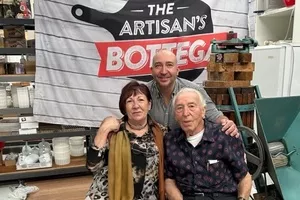The captivating furniture mogul is set to win the heart of a nation once again in Palazzo di Cozzo, a documentary that traces his journey from penniless Sicilian immigrant in 1956 to millionaire of legendary status today.
Directed by Madeleine Martiniello – whose paternal grandparents migrated to Australia from Campania in the same year as Cozzo – the documentary will make its world premiere at this year’s Melbourne International Film Festival (MIFF), which is set to run from August 5 to 22.
When we meet at his famed Footscray store to discuss the film, Cozzo greets me with open arms – literally – and his familiar, contagious smile.
Though many years have passed since he took Australia by storm with his multilingual television ads, his charm and passion for people still emanate from across the showroom.
“Anything-a you want,” he exclaims in his thick Italian accent as he welcomes me into his office, which overlooks the flamboyant baroque furniture on display.
He insists that we speak in his mother tongue and his Sicilian twang is reminiscent of another time and place.
Born in the small town of Ramacca, on the eastern side of the Italian island, Cozzo migrated to Australia in 1956.
At just 21 years old, he set foot on Australian soil on January 26, not speaking a word of the language.
When asked if he knew anybody in Melbourne at the time, he dramatically exclaims: “Neanche una mosca!” (Not even a fly!)
“A family from Sicily had sponsored me to come to Australia and they were supposed to pick me up from the port,” he recalls.
“But when I arrived, there was no one there.
“I took a taxi to the family’s house in Coburg; when I got there I asked them if they could pay the fare because I didn’t even have four pounds.”
A week after his arrival, Cozzo began working as a launderer, in the midst of a scorching Australian summer.
As he sweated it out for hours on end, he had just two words on his mind: success and fortune.
A few weeks later, Cozzo landed a job as a door-to-door salesman and his innate talent for selling was discovered.
Within a year of arriving in Australia, he had realised every migrant’s dream and bought his first house in Chapel Street, Fitzroy.
“I lived with a group of young guys from Ramacca,” he says.
“They were good friends of mine and, every night, I felt like I was back in my hometown.”
While never forgetting his roots, Cozzo became a cultural icon by building a furniture empire in Brunswick and Footscray, his experience encapsulating the ideal for those who have uprooted to seek a better life in a new land.
Part biography, part cultural celebration, Palazzo di Cozzo traces Cozzo’s personal fortunes alongside those of the generations of migrants who have been drawn to his ornate, ostentatious wares, viewing ownership of them as a sign of success.
When asked what he believes his own secret to success was, Cozzo is quick to respond.
“My secret is my personal philosophy: being well-mannered and polite,” he declares.
“I always sold myself with sincerity and the truth... that’s what counts.
“These values were instilled in me by my parents; my father was terribly strict but he taught me how to live.”
As well as his dogged determination, Cozzo’s charisma and passion for entertaining undeniably helped to launch him into the national spotlight.
Having opened four stores selling furniture imported from Italy, Cozzo presented Australian television’s first non-English musical variety show, Carosello, which first aired in 1967 on Channel 0.
From that moment on, he became a household name for Italian families in Australia and abroad, who would unite in lounge rooms to watch the show every Sunday.
The ‘70s and ‘80s saw the advent of his famous low-budget trilingual ads, which, generations later, are still recited by those who weren’t even a thought in their parents’ minds at the time of their release.
“My ads were lively and they reached everyone,” Cozzo says.
“People will never forget them... it’s not easy to forget Franco Cozzo!”
The twinkle in his eye and the conviction in his voice tell me that Cozzo is just as ambitious today as he was at the height of his career.
At 85 years old, with 10 children, eight grandchildren – one of whom calls him “Nonno Franco Cozzo” – and two great-grandchildren, Cozzo has no plans of slowing down anytime soon.
“If I stopped working, my life would be over,” he shrugs.
“What would I do? Where would I go?”
One thing is certain: as soon as international borders reopen, Cozzo will be on the first plane to Italy.
“I have to go back to my Sicily and see the walls of my town,” he proclaims, banging the table with his fist out of exasperation.
“I adore Ramacca; it’s small but beautiful.
“People stop to say good morning, and they mean it.
“When I’d go to Italy to buy furniture, I’d always spend a month there.
“I have a house there with a car in the garage.”
Until Cozzo can inhale the salty Sicilian air once again, he will be doing what he knows best: pleasing the people.
At the end of our conversation, Cozzo’s concluding remark reminds me of how he captured the heart of a nation and why he continues to be a beloved icon to this day.
“If you ever need me I’m always at your disposal!”
Spoken in true Franco Cozzo style.
Palazzo di Cozzo will screen on August 8 and 14 at the Comedy Theatre, and August 10 at the Forum Theatre as part of MIFF. The film will have a national release on September 16. For more information and tickets, visit the MIFF website.




























